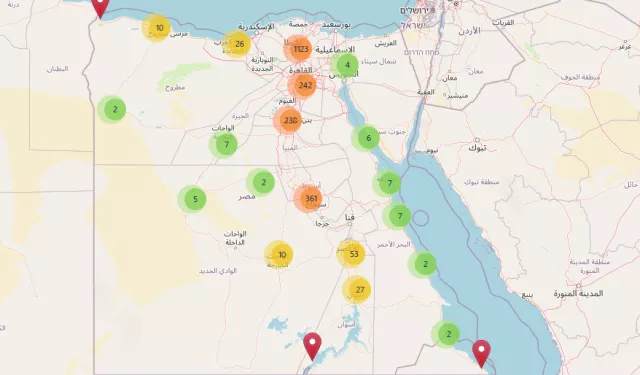Egyptian feminist group “Barah Aamen/Safe Space” has unveiled a nationwide map of sexual and reproductive health services, aiming to break entrenched barriers to testing, counselling, and treatment—especially for women, people living with HIV, and others most vulnerable to stigma and discrimination.
The map, launched this week, is designed to give people direct, stigma-free access to vital information and public and private facilities across Egypt. “We created the map after seeing a clear and urgent need,” the organization’s executive director, Shaimaa Tantawy, told Al Manassa.
In Egypt, the UNAIDS program estimates around 30,000 people were living with HIV in 2021. Only 65% of them know their status, and about 40% are receiving antiretroviral treatment.
“Our work on sexual and reproductive health showed us how widespread stigma still is. We previously produced a report documenting the discrimination vulnerable groups face, which revealed both the scale of HIV transmission and the barriers people encounter when trying to access care,” Shaimaa added.
“Some women contract HIV from their husbands without ever knowing,” Tantawy said. “And tragically, their children can become infected as a result. The lack of awareness—combined with the stigma around any test linked to sexually transmitted infections—means early detection, and early treatment, rarely happen.”
She added that the map aims to “spread awareness so no one is left without information”, encourage people to ask questions, and help vulnerable groups and people living with HIV reach services without delay. “HIV testing is extremely expensive in private labs,” she said, “and people face stigma and discrimination at every stage.”
The map covers all Egyptian governorates, listing governmental and non-governmental health facilities that offer testing, counselling, treatment, and psychosocial support.
Tantawy stressed that the platform serves more than people living with HIV. “Healthcare workers—doctors and nurses—are also among the groups most at risk,” she said.
The organization built the map using data systematically collected from government agencies including the Ministry of Health and the National AIDS Program, as well as civil society groups and community initiatives working in sexual and reproductive health. Tantawy described the platform as “a form of open-source knowledge that helps everyone access their health rights fairly.”
Founded in 2015, Barah Aamen is a feminist organization that works to combat violence and discrimination against women and girls in private spaces, and to highlight how such abuses contribute to women’s exclusion from public life. Its programs also focus on expanding access to information and services.
An estimated 40.8 million people worldwide were living with HIV at the end of 2024, 65% of them in the African region, according to World Health Organization reports.
